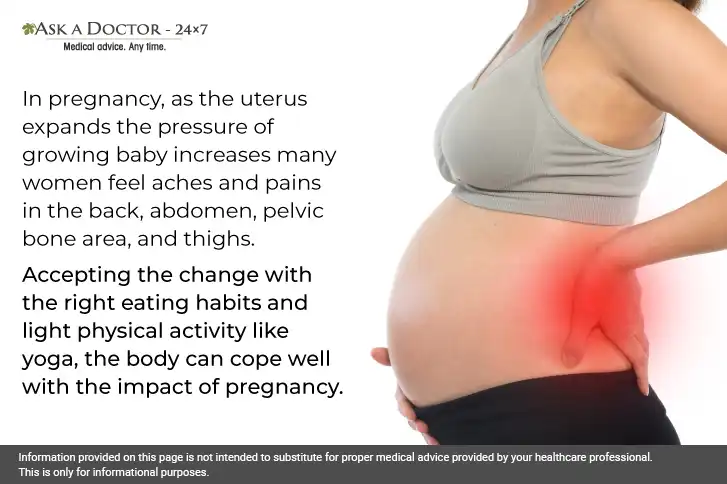Impact Of Pregnancy On A Woman's Body And Mind
Pregnancy embarks upon a journey wherein a woman's body undergoes profound transformations. The joy of bringing a new life into existence is unparalleled. However, there are also significant physical and emotional changes that accompany this transformative experience and turn it into both exhilarating and challenging. In this comprehensive guide, we will explore the diverse impacts of pregnancy on a woman's body – grounding our insights from authoritative sources such as the World Health Organization (WHO).
From the miraculous development of a new life within the womb to the postpartum adjustments, we'll navigate through every aspect of this transformative journey. Read on…
How Does a Woman’s Body Change During Pregnancy?

According to the NIH, pregnancy can have a significant impact on a woman's body, both during the gestational period and in the postpartum phase. During pregnancy, a woman's body undergoes a series of adaptations to accommodate the growing fetus, placenta, and amniotic fluid. These changes can affect various systems, including the cardiovascular, respiratory, and musculoskeletal systems.
1. Expansion of Uterus
One of the most notable changes is the expansion of the uterus, which can grow from the size of a pear to the size of a watermelon by the end of the pregnancy. This expansion can lead to various discomforts, such as back pain, pelvic pain, and the development of stretch marks. The WHO recommends that pregnant women engage in regular physical activity and maintain good posture to alleviate these discomforts.
2. Cardiovascular Alterations
The cardiovascular system also undergoes significant changes during pregnancy. WHO states that a woman's blood volume can increase by as much as fifty percent, and her heart rate can rise by 10 to 15 beats per minute. These changes can lead to the development of varicose veins, hemorrhoids, and other circulatory issues. This is why pregnant women are advised to stay hydrated, wear compression stockings, and avoid standing for prolonged periods to manage these conditions.
3. Postpartum Physical and Mental Issues
After delivery, a woman's body starts to transform as it regains from the demands of pregnancy and childbirth. The WHO emphasizes that the postpartum period is a tough time for a woman's physical and emotional well-being. At this time, women encounter issues such as postpartum bleeding, uterine involution, and hormonal fluctuations, which can affect their overall health and well-being.
To address these challenges, the WHO recommends that women receive comprehensive postpartum care, including regular check-ups, support for breastfeeding, and access to mental health resources. Women need to prioritize self-care and seek medical attention if they experience any concerning symptoms or complications. You can ask a specialist online at ask a doctor 24x7, anytime from anywhere.
5 Things You Can Do to Cope With Postpartum Body Changes
A woman’s body looks and feels different after giving birth to a child. The body does a lot of shifting and changing in growing a baby and then accommodates a lot to bring that new life into the world. Post-delivery, it further gets tasked with feeding the baby and healing itself from the birth process. It adapts to learn to hold and carry the baby, doing all these while getting very little sleep, which in turn exhausts a woman.
To cope with these postpartum body changes and slowly get back to ease, new mommies should start practicing these easy-to-do things in their lifestyle:
1. Eat high-fiber foods and drink plenty of water to stimulate bowel activity and deal well with constipation. Drinking water will also help relieve hemorrhoids and ease problems with urinating after birth.
2. Take plenty of rest to help the body heal itself. Try to rest with the baby or whenever you can. Whenever you feel exhausted, seek help from family or friends and rest. Set the time for feeding and stick to it so that the baby's stomach does not get over full and you too get fixed sleep times. The best practice is to feed a baby every 3 hours.
3. Start practicing Kegel exercises as they can help to strengthen your pelvic muscles. To heal the stretches and tears of pelvic muscles start icing the area with cold packs wrapped in towels, and sitting on a pillow. Make sure to Ask A Gynecologist about when to begin with Kegel Exercise.
4. Talk to a doctor about safe medication options to deal with uterine pain. After giving birth, the uterus begins to shrink and cause cramping which leads to uterine pain. Although this pain subsides, never hesitate to consult a specialist.
For managing postpartum mental stress make sure to consult a psychologist without delay. Remember, mental health matters the most in nurturing a baby, yourself as well as the whole family.
Conclusion

In conclusion, the impact of pregnancy on a woman's body is multifaceted and complex. By understanding the various changes and adaptations that occur, women can better prepare for and manage the physical and emotional challenges they may face during and after pregnancy. By following the guidance and recommendations provided by the WHO, women can navigate this transformative experience with greater confidence and support.
If you're lingering on many unanswered queries and troubles with postpartum challenges and wondering whom to ask, then simply Ask a Gynecologist online, anytime, 24x7 as per your convenience at Ask a Doctor 24x7.
Recently Answered Queries Related to Postpartum Issues
- What Causes Tingling Throughout the Body, Chest Pain, And Headaches 8 Months Postpartum?
- Postpartum Swelling, Tingling In The Right Hand, Shortness Of Breath, Given Percoset, Ibuprofen, Vicodin. Dosage?
- Suggest Treatment For Postpartum Depression
- Postpartum Thyroiditis, Profuse Sweating, T4 Normal, TSH High, Bilateral Nodules. Meaning?
- Mechanism Of Cystic Mass On Each Side Of Axillary Region Of 7-Day Postpartum Women. Physiologic Or Pathologic Change?
- Should I seek treatment while attempting a second pregnancy in middle age?
- Suggest treatment for insomnia when under stress
Disclaimer: Information provided on this page is not intended to substitute for proper medical advice provided by your healthcare professional. This is only for informational purposes
Ask a Specialist
Recent Questions

.jpg)
